Blast Off!
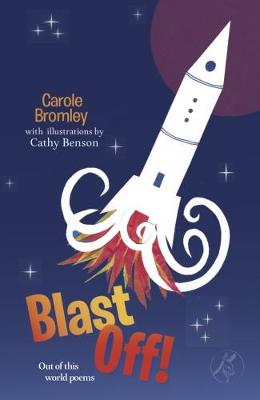
By Author / Illustrator
Carole Bromley, Catherine Benson
Genre
Adventure
Age range(s)
7+
Publisher
Smith/Doorstop Books
ISBN
9781910367766
Format
Paperback / softback
Reviews
Alison
This is Carole Bromley's first anthology for children (published by a new imprint Small Donkey Books) and a very welcome addition to the world of children's poetry it is too. It has children - their interests, their concerns, their sense of the ridiculous - firmly at its heart. The title poem, Blast Off! (p.28), has shades of Where the Wild Things Are although in this case it's the child's refusal to do sums that leads to I-Pad removal and resort to the fantasy world offered by the rocket in her (or is it a 'he'? I like the way the child's voice could be either in many of the poems) bedroom. Countdown to zero 'and I'm off, / heading straight for Mars, / steering with my frisbee wheel / past unfamiliar stars.' And, just as Max finds his fantasy world ultimately lonely, so it is for this child who finds 'I'm hungry and I'm small /' and returns to mum's countdown: 'What on earth are you up to? Right! / I'm counting. Eight. Nine. Ten.' There's an alien in my wardrobe (p.64) appeals to the age-old themes of both imaginary friends and something or somebody lurking in the bedroom: this time it's a friendly alien in the wardrobe who is, of course, known only to the child who nicks tin cans from the recycling with which to feed him. Risk of discovery lurks though because of the moonwalking lessons which leave 'green footprints / wherever he goes / and I have no idea / how I'll explain those.' The final and fitting realisation is that 'he'll leave me / I can't keep him forever. / I'll wake up and he'll be gone.' There are more bedroom secrets in Under my Bed (p.25), another powerful imaginative space for children. Here, it's what is to be found: 'the spider I didn't want to kill, / some fluff, my walkie-talkie doll./ The poem moves in and out of the familiar, ('plimsolls, slippers, outdoor shoes'), the unexpected ('a sleeping cat'), fantasy ('a ghost') and poignancy at the end: 'the lost key from my brother's train, / that friend I'll never see again'. School Dinners (p.30) bridges the gap between home and school. 'I wish I could go home for lunch / and eat a bowl of monster munch.' it starts, before a series of rhyming couplets bring us full circle to the monster munch wish again. There's a canny reference to the things that grown-up say (to no effect): 'Grandad says 'When I was small / we didn't have no lunch at all, / we just did sums and learnt to read / and then went home to boiled swede'. Still in school, 'Golden Time' (p41) offers a fanciful wish list. The repetition of 'I might...' is something children will enjoying using to create their own wish lists. There are other poems in the collection that provide opportunities for the children's own writing. Who is it? (p.20) uses simple repeated questions to structure a powerful three verse poem about an owl: 'Who is it, / I called. / There was no reply, / just a rush of wings as an owl flew by./' The repetition offers a structure that children could use for their own writing. There is a clever DIY Zoo Poem (p.22) which taps into children's sense of rhyme and rhythm as they are asked to supply the missing words: 'I went to the zoo and looked in a cage, / Beware of these tigers. They get in a ......./.' For cross-curricular fun, look at The Six Wives (p.38) which provides a pithy rhyming history lesson: 'Catherine Aragon was first to go; / he went to the Pope and the Pope said no / but Henry was a stubborn so and so.' There is a rich vein of poems running through the book which draw on intertextual knowledge and subvert traditional texts. Unsuitable Nursery Rhymes (p.54) offers well known opening lines which segue into an unconventional twist: 'Mary, Mary, quite contrary / how does your garden grow? / Same as everyone else's. / Who wants to know?' Then there's Snow White (p.67) who has 'nothing against little men / and there's safety in numbers' but nevertheless finds the accommodation a 'tad snug, / it was like living in a doll's house /.' Children will enjoy the complicity with SW when she confides in the final verse 'You know how it went. / The whole prince to the rescue scene. /' Cathy Benson's is a delightful depiction of the little men 'hi-hoeing down the path / with their shovels and picks. /' Equally engaging is her illustration of the three bears (p.70) humouring baby bear ('their spoilt wee brat') by swinging him as they take a walk in the woods while their porridge cools. But, of course, the real spoilt brat in this poem is Goldilocks having her little rant: 'just absurd / bears eating porridge, bears wearing frocks - / next time they're out 'm changing the locks. With its blast of myriad themes and forms, the anthology really does live up to its name!
Suggested Reading Age 7+
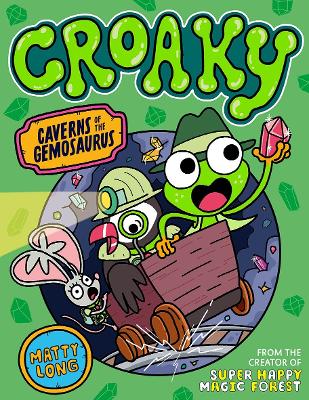 Croaky: Caverns of the Gemosaurus
Croaky: Caverns of the Gemosaurus
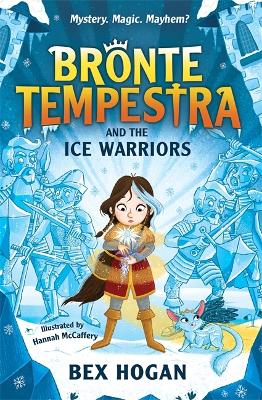 Bronte Tempestra and the Ice Warriors
Bronte Tempestra and the Ice Warriors
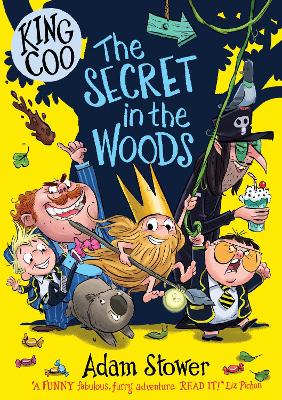 King Coo: The Secret in the Woods
King Coo: The Secret in the Woods
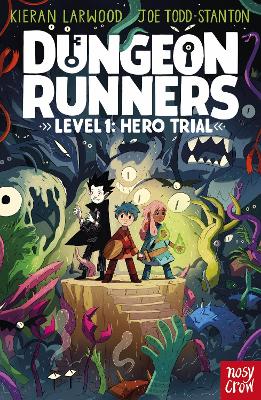 Dungeon Runners: Hero Trial
Dungeon Runners: Hero Trial
